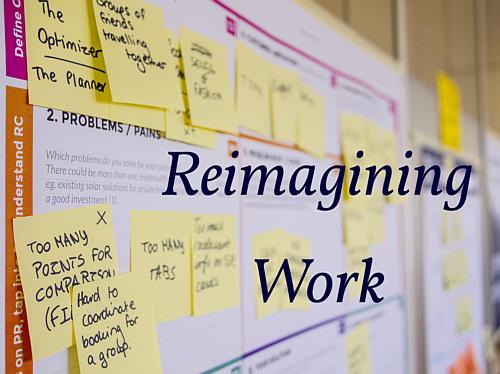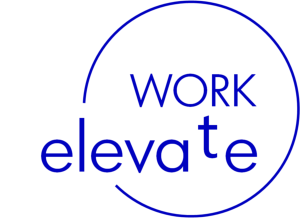
BEing in Business - Leadership Development Dialogues
Join other business leaders as we explore the challenges and opportunities of the day. These participatory Dialogues are the perfect place to experientially learn and develop capacities for next generation leadership! Come often!
*** To be informed of upcoming Dialogues, please add your name to our notification list.
About ElevateWork
We are an international group of facilitators, trainers and coaches with a shared mission to elevate the world of work in collaboration with other like-minded, like-hearted leaders and organizations.
ElevateWork specializes in facilitating highly effective online meetings, holistic leadership mentoring and cultural change. Open Space Technology, Bohm Dialogue, online Open Space conferences, participative online meeting facilitation, Cohering Community, and facilitator training are our specialties.
What is Bohm Dialogue?
Over a span of 25 years, David Bohm spent a considerable amount of time in conversation with the famous philosopher and teacher, Jiddu Krisnamurti. From Bohm's experience of these conversations, David Bohm proposed a powerful, free flowing way of dialoguing where people practice experiencing everyone's point of view fully, equally and non-judgmentally in order to reach common understanding.
Bohm felt that open dialogue could help us solve the many crises that face society and expand human consciousness. Indeed, in a world where polarized, fear and domination-based communication is the norm, Bohm dialogue gives us a simple structure to elevate the way we relate to ourselves, each other and the world, preparing the ground for deeper learning, connection and collaboration.
What happens in Bohm Dialogue?
In Bohm Dialogue, there is often no set agenda or focused subject to talk about. Instead, the topic(s) or themes emerge out of the active listening and contributions of the participants present. There is no facilitator making anything happen, but rather a 'Host' that also participates, notices when the conversation slips out of dialogue, and invites people back into the practice. The group, through their contributions of suspending, respecting, voicing and listening, notice as themes, insights, learning and wisdom naturally emerge over the course of the conversation.
A Bohm Dialogue agenda tends to be very simple:
1. Welcome: The host welcomes participants, explains the practices of dialogue and invites participants into agreement. If there is a subject or theme for the dialogue, this is clarified.
2. Check-in: Each participant does a brief 'check-in,' introducing themselves and 'what is moving within them' at the moment.
3. Flow: An open dialogue continues, taking its lead from what emerged in the check-in, following the flow of what participants notice as they speak, listen, think and feel together.
4. Closing: A final round or 'check-out' is conducted where everyone gets an opportunity to briefly share their experience and what they are taking away from the experience.
The Bohm Dialogue Practices
Participants are invited to agree to 'practices' for the dialogue. It is a 'practice', because most of us are not skilled in dialogue and fall into old polarizing habits. Together, we will develop our capacity for open dialogue but at times we will get off track, notice this, and come back into the practice. For example, consider the practice of meditation, where your mind may spin off into thinking until you notice this and pull yourself back into watching your breath. Our four Bohm Dialogue practices are:
1. SUSPENDING: Letting go of assumptions, beliefs or certainty about things and opening up to other possibilities, viewpoints, experiences or ideas. This is not about convincing others of your views, but with curiosity, attempting to connect and understand them, and in the process, knowing yourself too.
2. RESPECTING: Seeing and respecting the humanity in others and relating with empathy and compassion to their life journey. By seeing them, you may see yourself more clearly too.
3. VOICING: Discovering your authentic voice and trusting it. This is not about saying something clever or wise. It is about noticing the call within you to speak, or to just respectfully listen and notice that others might be saying exactly what you wanted to say. Speak about only one important idea at a time, rather than talking about all the run-on thoughts arising in you. Less is more. If you or someone is dominating the conversation, notice this and find a way to come back into balanced dialogue.
4. LISTENING: Listen with all your senses and intuition, to the whole person behind the words. You will be listening far more than speaking. With curiosity, hear the tone, cadence, pitch, pauses, movements, meaning, energy, emotions, values and intentions of the speakers. Be present to the beauty and richness of the silent moments too.
To respect means that you accept others for whom they really are, even when they are different from you, or you don't agree with them. In the Bohm Dialogue practice of respecting:
- We are invited to see beyond our differences and respect the core humanity in others.
- We practice relating with empathy and compassion to the life journey of others.
- In the practice of seeing, hearing and accepting others, we open up the opportunity to find shared meaning and harmony.
- We create a safer, more trusting space to set aside differences, and open up the conversation for higher learning and contribution.
- People feel valued and thus are more present, confident and engaged.
The practice of suspending is critical to effective leadership and building collaborative, coherent, innovative team cultures.
Everyone holds assumptions, opinions, beliefs or judgments. This is a normal part of how human beings filter perception and make sense of the world. However, these often inhibit open communication, create distrust, cause conflict, stifle creativity, and block understanding.
- Assumptions and beliefs are often not conscious to the person holding them or to the group or team. They may not even be true. By clarifying assumptions, it can help individuals and teams get to the causal level of problem-solving rather than reacting or fixing something that is not relevant or is outdated.
- Judgments and opinions can get personal and nobody likes to feel judged. This can create distrust, reactivity and shut down the conversation. They also may not be true. By holding your positions lightly, you open up to new insights and ideas.
In the Bohm Dialogue practice of 'suspending', participants are invited to at least temporarily suspend or let go of assumptions, beliefs or certainty about things and open up to understanding other possibilities, viewpoints, experiences or ideas. Dialogue is not about convincing others of your views, but with curiosity, attempting to clarify, connect and understand others. In the practice of opening your mind, you may come to knowing yourself better too.
Some tips for suspending:
- Notice or identify your own assumptions about what you are hearing or voicing. Consider being transparent and putting your assumptions out into the open so that others know where you are coming from.
- Imagine putting your assumptions 'on a shelf,' temporarily putting them aside. You can always bring them back down later.
- Be curious and invite clarification about what assumptions others are making or the hidden assumptions of the group. "What are some of the assumptions we are making about this situation?" "Are these useful or true?"
- Notice your own self-talk, feelings and emotions as they arise. If you find yourself getting emotionally upset, or misunderstanding/conflict arises, examine your own assumptions, beliefs and judgments around this. Pause and be present with the upset. Is it a pattern for you? What is at the core of this upset? When you let go of the source of the upset/conflict within yourself, the pattern usually goes away. If needed, get some assistance from a mentor to help you resolve it.
- Notice yours or the groups beliefs about what is emerging in the Dialogue. Are those limiting or empowering and helpful? If limiting, what would you want instead? What would be more empowering beliefs to hold? How could the impossible be turned into the possible?



